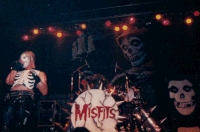
Photo from wikipedia
Almost since its inception, punk has been declared dead. What does it mean to live attached to something that is always, at least a little bit, gone? Examining how Justin… Click to show full abstract
Almost since its inception, punk has been declared dead. What does it mean to live attached to something that is always, at least a little bit, gone? Examining how Justin Pearson merges personal accounts of death and mourning with a sense of punk that is rooted in loss in his memoir of his participation in a North American punk culture since the 1990s, From the Graveyard of the Arousal Industry, this article considers how a focus on living in the wake of the death of punk might shift scholarly and popular narratives told about punk. Punk outlives its death in the 1970s with a redemptive rebirth in which it became the subject of an anti-capitalist narrative. The article considers how Pearson’s memoir explores a different framework by insisting that punk may not be able to separate itself from the wider world, and that while this might appear to deal a death blow to punk, it also names a persistent set of conditions that define punk. After placing the memoir in the context of this redemptive account of punk as well as among those who see its limits, the article offers an analysis of several scenes addressing personal losses that merge with Pearson’s attachment to punk-as-something-dead-and-gone. The deaths that Pearson associates with punk rock are personal, but they also register the larger significance of loss for a subculture that cannot stop declaring its own demise, including especially the loss of a fantasy that sees punk as a refuge from the world.
Journal Title: European Journal of Cultural Studies
Year Published: 2021
Link to full text (if available)
Share on Social Media: Sign Up to like & get
recommendations!